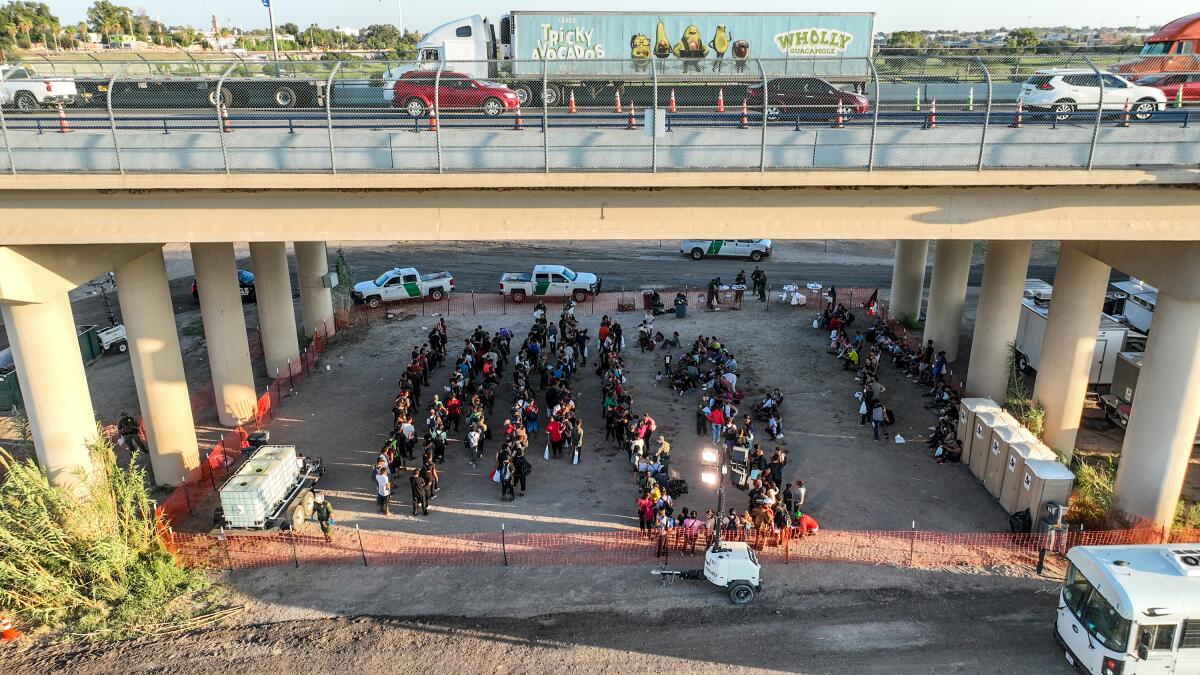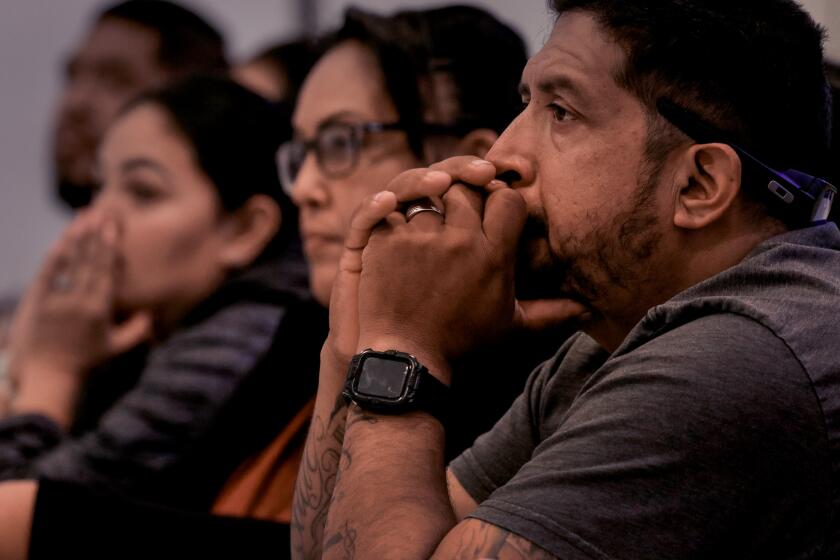Biden agrees to settle ACLU lawsuit over Trump-era migrant family separations

WASHINGTON — Government policies that cause widespread separation of migrant children from their parents would be banned under a proposed legal settlement filed Monday by the Biden administration and the American Civil Liberties Union.
If approved by a judge, the settlement, filed after three years of negotiation in federal court for the Southern District of California, would prevent the federal government from using prosecutions of adults who enter the U.S. illegally to separate them from their children.
Under former President Trump’s “zero tolerance” policy, the government regularly prosecuted and jailed migrant parents who crossed the border without authorization, including asylum seekers. That took place despite U.S. and international law mandating the right to seek asylum regardless of how someone arrived on U.S. soil.
Because children couldn’t go to jail with their parents while their parents awaited trial, federal officials placed the children in federal custody or with foster families. From May 5 to June 20, 2018, more than 3,000 children were forcibly separated from their parents, many of whom were ultimately deported.
“Today’s agreement reflects the Biden-Harris administration’s unwavering commitment to reunify families who suffered because of the prior administration’s cruel and inhumane policy, and our steadfast adherence to our nation’s most dearly held values,” said Alejandro Mayorkas, secretary of the Department of Homeland Security. “The Department of Homeland Security has taken steps to ensure that the prior practice of separating families does not happen again, and we are continuing the work of reuniting children with their parents.”
The ACLU said that under the proposed settlement, people who were separated from their families would qualify for lawful entry and three-year, renewable work permits, and certain housing, health and legal services benefits. They would be able to apply for asylum, regardless of previous denials, and wouldn’t be subject to the usual one-year application deadline.
Future separations would be allowed only in cases of abuse, national security threats, medical emergencies or if the parent has committed serious crimes, according to the Department of Justice. Separations would also have to be documented in a database shared among government agencies, and family members’ attorneys would have to be notified quickly and allowed to challenge the separations, the ACLU said.
Monday’s agreement expands the number of people covered by the lawsuit — currently about 3,900 children — by at least 500 to cover the entire four years of the Trump administration, according to the ACLU. Also included are adults who can prove they were the child’s legal guardian, as well as non-citizen parents who were separated from their U.S. citizen children.
The agreement creates an appeal process for hundreds of families that were previously excluded from the class because parents had committed minor crimes, were erroneously accused of child abuse or alleged to not be the child’s real parent, the ACLU said.
More than 770 children have been reunited with their families since Trump left office, according to federal officials, but Lee Gelernt, lead counsel of the ACLU, believes that 500 to 1,000 children remain separated from their parents. At least 200 children under age 5 were separated from their parents; the youngest was 6 months old, he said.
Eighty-five children are currently in the process of being reunited with their families, senior administration officials said. Three quarters of the originally identified families have been reunited or provided information to begin the process, they said.
Federal officials said they have identified more than 290 U.S. citizen children who were separated after crossing the southern border with their non-citizen parents and are working to locate them.
Advocates said they have not found the families of about 75 children, despite years of searching. In other cases, families they had previously made contact with moved, changed phone numbers or are in hiding.
“In my 30 years doing this work, the family separation policy was by far the worst thing I’ve ever seen,” said Gelernt of the ACLU, which filed a class-action lawsuit against the U.S. government over the separations. “Nothing can ever erase what the Trump administration deliberately did to these little children, but this settlement is a critical step forward.”
The Biden administration previously halted settlement talks after the Wall Street Journal reported that officials had considered paying each person who was separated from their family $450,000. The government has since settled a handful of individual cases for smaller amounts, Gelernt said, while others remain ongoing.
The Biden administration has repeatedly criticized the Trump-era policy, and in 2021 launched a task force that helps reunite families separated at the border.
A 2021 report by the Department of Justice inspector general criticized the government’s handling of the families, concluding that “the Department’s single-minded focus on increasing immigration prosecutions came at the expense of careful and appropriate consideration of the impact of family unit prosecutions and child separations.”
Last month, an independent federal court monitor said Border Patrol agents had separated migrant children, some as young as 8, from their parents for several days to avoid overcrowding in a Texas holding facility. The separated children were kept in areas typically reserved for unaccompanied children, with most unaware “of any protocols that would allow them to request a visit with their parents,” Dr. Paul Wise, a pediatrician, wrote in the 71-page report.
Wise raised concerns that the children faced significant emotional distress related to the separation, but stressed that the separations were different from those under Trump’s policy because the families were reunited upon release.
Earlier this year, Trump was asked about potentially bringing back the family-separation policy.
“Well, when you have that policy, people don’t come. If a family hears they’re going to be separated, they love their family, they don’t come,” he said in a town hall on CNN.
The ACLU has asked the court to enforce the settlement. Under the agreement reached with the federal government, the court would have jurisdiction for six years to enforce provisions about Trump-era separations and eight years to enforce provisions about future separations. Gelernt said the ACLU is prepared to file a new lawsuit after eight years if necessary.
The federal government has also agreed to continue funding a family reunification process and to update the ACLU when it discovers information that could help reunify families, the group’s lawyers said. People who believe they are class members can submit claims via the website together.gov.
More to Read
Get the L.A. Times Politics newsletter
Deeply reported insights into legislation, politics and policy from Sacramento, Washington and beyond. In your inbox three times per week.
You may occasionally receive promotional content from the Los Angeles Times.












